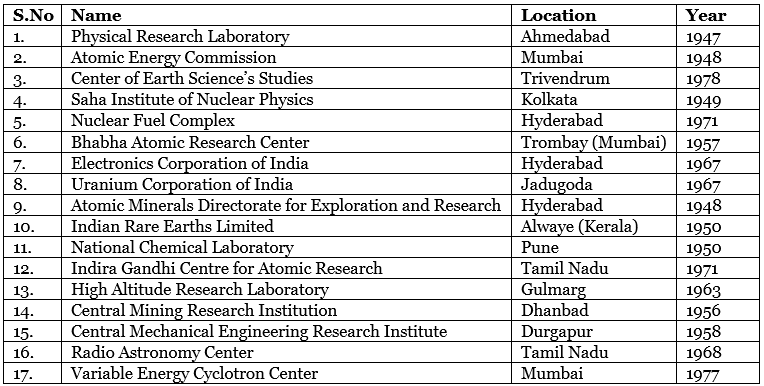Nuclear & Space Research Centres in India | Famous Books for UPSC Exam (Summary & Tests) PDF Download
List of Nuclear Research Centres in India
The Indian nuclear research centers fall under the jurisdiction of the Department of Atomic Energy (DAE), which plays a crucial role in promoting the utilization of nuclear energy within the nation. The DAE supervises several research centers, some of which include the Bhabha Atomic Research Centre, Indira Gandhi Centre for Atomic Research, and Variable Energy Cyclotron Centre, among others. Here is a list of nuclear research centres in India:
Top Nuclear and Space Research Centres in India
1. Bhabha Atomic Research Centre (BARC)
BARC, situated in Trombay, Mumbai, is India's premier nuclear research facility. It conducts research in various areas, including engineering, nuclear science, and technology. BARC is responsible for designing and constructing India's nuclear reactors and leads research in nuclear fuel, materials science, and radiation protection. Renamed in 1967 as a tribute to the legendary scientist Dr. Bhabha, it is currently under the directorship of Dr. Ajit Kumar Mohanty since his appointment in 2019. BARC's objectives include exploring the peaceful applications of nuclear power and energy and maintaining eight research reactors: Apsara, Cirus, Dhruva, Zerlina, Purnima I, II, and III.
2. Atomic Energy Commission of India
The Atomic Energy Commission (AEC) of India is responsible for the development and management of nuclear energy in the country. Established in August 1948 and operating under the Department of Atomic Energy, its headquarters are in Mumbai. The AEC aims to plan, execute, and control India's nuclear power programs, including research and utilization of nuclear energy for diverse applications such as agriculture, power generation, medicine, industry, and scientific research. The first chairman of AEC was Homi J. Bhabha, and the current Chairman is K.N. Vyas, appointed in 2019.
3. Electronics Corporation of India Limited (ECIL)
ECIL, established in April 1967 and headquartered in Hyderabad, operates under the Department of Atomic Energy, Government of India. Its primary focus is on designing, developing, and manufacturing a wide range of electronics products and solutions for various sectors, including nuclear, space, defense, security, and government. Retired Admiral Sanjay Chaubey currently serves as the Chairman and MD of ECIL, assuming the position in 2018. ECIL actively promotes the peaceful use of atomic energy.
4. Uranium Corporation of India Limited (UCIL)
UCIL, a Public Sector Enterprise (PSU), also operates under the Department of Atomic Energy. It was established on October 4, 1967, with its headquarters located in Singhbhum. UCIL is committed to environmental sustainability and focuses on the mining and processing of uranium ore to produce nuclear fuel for power plants. Sh. C.K Asnani is the current MD and Chairman of UCIL since his appointment in March 2020. UCIL also explores and develops new uranium deposits within India and abroad.
5. India Rare Earths Limited (IREL)
IREL, a public sector enterprise, was formerly known as the Indian Rare Earths Limited. It was established on August 18, 1950, with its first branch in Aluva, Kochi. Fully developed as a Government of India organization in 1963, IREL operates under the Department of Atomic Energy. Its main business involves mining and processing rare earth minerals, such as monazite rich in thorium, a valuable mineral used in the nuclear industry. IREL is also involved in producing various rare earth compounds, alloys, and metals used in electronics, defense, aerospace, and renewable energy industries.
6. Tata Institute of Fundamental Research (TIFR)
TIFR conducts research in diverse fields of science, including mathematics, computer science, physics, chemistry, biology, and interdisciplinary areas. It operates as a national nuclear research center in India, under the purview of the Government of India and the Department of Atomic Energy. Apart from research, TIFR offers master's and doctoral level degrees, as well as programs in science education and science communication. The institute was established in 1945 with support from Sir Dorabji Tata Trust and was set up under the guidance of Dr. Homi J. Bhabha.
7. Saha Institute of Nuclear Physics (SINP)
SINP focuses on fundamental research in nuclear physics, astrophysics, and related fields. It conducts research programs in experimental and theoretical physics, with an emphasis on nuclear astrophysics, high-energy particle physics, and condensed matter physics. SINP is located in Bidhannagar city, Kolkata, India, and was established by Professor Meghnad Saha. In 1956, it was renamed SINP in honor of Dr. Saha. The institution also offers various courses and degrees.
8. Nuclear Fuel Complex (NFC)
The Nuclear Fuel Complex, located in Hyderabad, is a government-owned enterprise responsible for producing nuclear fuel for India's nuclear power plants. NFC manufactures different types of nuclear fuel, including enriched uranium, zirconium alloy fuel tubes, and mixed oxide (MOX) fuel. Additionally, NFC produces heavy water, which serves as a moderator in certain nuclear reactors. As an industrial division of the Department of Atomic Energy, its main goal is to make India self-reliant in nuclear fuel fabrication. Dr. Dinesh Srivastava serves as the Chairman cum CEO of NFC since his appointment in March 2020.
|
743 videos|1444 docs|633 tests
|
















